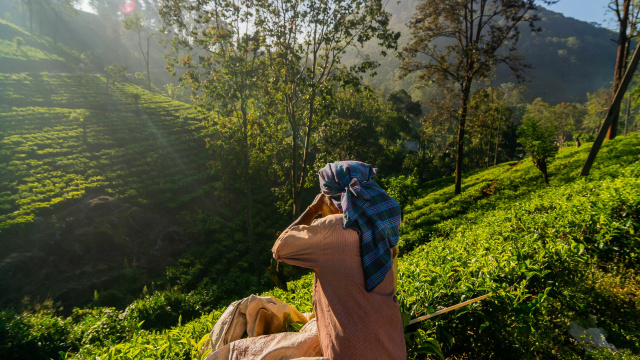Sri Lanka

Tea Plantations
The tea plantation experience is a combination of natural beauty, cultural knowledge and enjoyment.
Tea plantations in Sri Lanka are one of the most distinctive features of the landscape and an important part of the country's cultural and economic heritage. They are spread across lush green hills and highlands, creating a magnificent backdrop that attracts the attention of locals and visitors alike.
Their history dates back to the 19th century, when the British introduced tea cultivation after coffee growing was destroyed by an epidemic. Sri Lankan tea, known as "Ceylon Tea", soon became famous for its exceptional quality. The Assam variety prevailed because of its resistance to local conditions and laid the foundation for the development of the tea industry.
Today, the plantations are a key economic pillar and tourist attraction. Visitors can walk among the lush green tea bushes, learn about traditional harvesting methods from local workers and see the production process in tea factories.
In addition, many plantations have tasting areas where visitors can sample tea varieties and learn about the differences in flavours depending on the growing region. The hills of Nuwara Eliya, Ella and Haputale are particularly popular for these visits, while offering stunning views and a cool climate.
Experiencing a tea plantation is a combination of natural beauty, cultural knowledge and enjoyment, making it a must for those visiting Sri Lanka.
Their history dates back to the 19th century, when the British introduced tea cultivation after coffee growing was destroyed by an epidemic. Sri Lankan tea, known as "Ceylon Tea", soon became famous for its exceptional quality. The Assam variety prevailed because of its resistance to local conditions and laid the foundation for the development of the tea industry.
Today, the plantations are a key economic pillar and tourist attraction. Visitors can walk among the lush green tea bushes, learn about traditional harvesting methods from local workers and see the production process in tea factories.
In addition, many plantations have tasting areas where visitors can sample tea varieties and learn about the differences in flavours depending on the growing region. The hills of Nuwara Eliya, Ella and Haputale are particularly popular for these visits, while offering stunning views and a cool climate.
Experiencing a tea plantation is a combination of natural beauty, cultural knowledge and enjoyment, making it a must for those visiting Sri Lanka.

Dambulla
The temple, built in five caves, is home to ancient sculptures and frescoes of the Buddha.

Sigiriya
The huge rock, 200 metres high, formed the core of the Kasyapa kingdom in the 5th century AD.

Colombo
Colombo is the bustling capital of the country.

Pidurangala
At the top of the cliff you can enjoy a spectacular view of the green valley of the area and the Sigiriya rock.

Polonnaruwa
Polonnaruwa, the medieval capital of the country during the Chola dynasty.

Minneriya National Park
The park has rich ecosystems, including dense forests, open meadows and wetlands.

Kandy
In the city of Kandy, the heart of Buddhism beats because of the sacred "temple of the tooth".

Knuckles National Park
The park has been recognized by UNESCO as a habitat of global importance.

Heeloya
For hiking and nature lovers, Heeloya is an ideal destination.

Garandiala waterfall
A popular destination for visitors seeking an experience full of natural beauty and history.

Ella
Ella is a green town in the heart of tea country, offering endless opportunities for outdoor activities.

Knuckles
The Knuckles Range is an important habitat protected by UNESCO.

Ella Rock
One of the most popular hiking destinations in the Ella area.

Train Tracks
The train ride through the heart of the countryside is one of the most scenic in the world.

Tea Plantations
The tea plantation experience is a combination of natural beauty, cultural knowledge and enjoyment.

Eucalyptus Forest
This majestic forest is known for the dense eucalyptus trees that cover it.

Nine Arches Bridge
A symbol of the meeting of human creativity and natural beauty.

Waterfall Diyaluma
One of the highest waterfalls in South Asia, reaching a height of 220 metres.

Yala National Park
This beautiful wildlife sanctuary, which is the second largest in the country, is known for its rich biodiversity.

Tangalle
This area is known for its stunning beaches, characterized by crystal clear waters and white sandy beaches.

Ruhunu
The area is full of dense forests, waterfalls and rivers, offering an ideal destination for nature lovers.

Galle
The town of Galle is a picturesque town with strong Dutch and Portuguese colonial elements, classified as a Unesco heritage site.